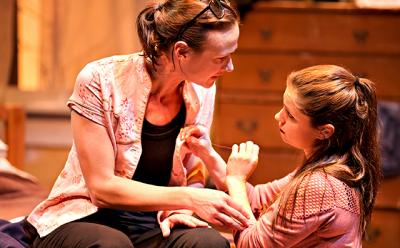Intense Performances in 'This Wide Night': a 'Tour de Force' for Actors

There is a moment early on in “This Wide Night,” a 2008 play by Chloe Moss, that speaks to the intensity of the performances in the current production at East Hampton’s Guild Hall: Lorraine, a woman recently released from prison, is asked by Marie, another former inmate with whom she has been temporarily staying, to leave her flat. Lorraine desperately needs Marie — they both need each other, in fact, though Marie can’t yet see this. So Marie, discreetly, asks her to go, and Lorraine, reluctantly, gets the hint.
Seating for the production of “This Wide Night” is unusual; the audience sits in roughly 70 chairs placed directly on the stage. You can literally reach out and touch the actors. I chose an odd seat, on the far left wing of the stage, but from this vantage I could see Lorraine’s exit. She’s mostly hiding her pain as she leaves, but once she’s out the door there is a final stab of terrible sorrow etched on her face. What was fascinating was that this moment was invisible to the audience, except, by accident, to me. Lorraine is into the hall and gone, the scene is over, and yet the actress is still going, still working, or too lost in the moment to care whether we can see her or not.
Chloe Dirksen, who plays Lorraine, is also the producer along with Jessica Mortellaro, who plays Marie. You may wonder why, in off-season East Hampton, anyone would submit herself to the difficult task of putting on a play about two female ex-cons. The answer turns out to be an easy one: “This Wide Night” is a tour de force for actresses. The play had a run in New York in 2010, garnering rave reviews for Edie Falco and Alison Pill. I did not see that production, but I will say that this current run is as about as good as regional theater acting gets.
The setting is a tiny flat in a sketchy part of London, where Marie (an excellent Ms. Mortellaro) is in the midst of her new life as an ex-convict. Jon Raynor’s set design is purposely decrepit; there’s not much more to the room than an old chair, a futon, and a beat-up television with no working sound. Marie has traded one cell for another. Her down time consists of eating junk food, drinking beer, and staring at the soundless television images. At night she works, though at a different job than we are initially led to believe. Her loneliness seems self-imposed, as if she’s not quite ready for the complications of friendship or love. And yet Lorraine, her old cellmate, has come knocking.
Ms. Mortellaro does a terrific job with Marie, portraying her with a kind of rough-hewn grace that requires a tricky balance. Play Marie too tough and she has no chance to open up later on; play her too sympathetic and her early resistance to Lorraine makes no sense. Ms. Mortellaro finds the middle ground between distance and empathy, while nailing the foul-mouthed humor and poetry of Ms. Moss’s script.
But there’s no doubting that Ms. Dirksen has the plum role. Unlike Marie, Lorraine is more overt about her need for companionship, and this gives the actress the lion’s share of the play’s pathos. From the second she arrives at Marie’s flat, it’s clear that Lorraine has no idea how to function in free society — she may as well have arrived from Pluto — and Ms. Dirksen perfectly captures her barely concealed terror. After 12 years in lock-up, life with a cellmate is all that Lorraine knows, and the performance allows us to see how desperate she is to recreate that scenario in Marie’s Lilliputian flat.
Later there is the revelation that Lorraine is a mother, hoping to reconnect with her son. When this connection does not go as planned, the play reaches its climax. Ms. Dirksen wrests every drop of emotion from the scene, though without a hint of mawkishness or sentimentality. And it’s a tribute to both performers that many in the audience appeared on the brink of losing their composure. (All right, that was me.)
Generally, Felix Bird’s music is interjected with tasteful discretion, though there is a moment or two when you wonder if you’re being nudged to feel something you are already feeling. Otherwise there’s no arguing with Joe Minutillo’s direction, which seems nuanced in every detail, including the actresses’ fine-tuned English accents.
After the opening night performance, for example, I was discussing the show at a bar across the street with a woman who said Ms. Dirksen was her neighbor. It became clear that I was assuming the actress was British.
“No, she lives here,” the woman admonished. “She’s Canadian.”
“This Wide Night” will run at Guild Hall through Saturday. It is not, of course, an easy sell. It is a play of difficult emotions, and a fair amount of pain; your wintry Hamptons complacency may be momentarily shaken. The payoff, however — emotional catharsis and powerful performances — will be well worth it.
An earlier version of this review credited only Chloe Dirksen as the producer of the play. It has been modified to reflect that Jessica Mortellaro is her co-producer.
